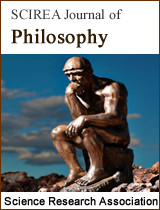The Reducible Relations between/among Valid Generalized Syllogisms with the Generalized Quantifiers in Square{most}
DOI: 10.54647/philosophy720092 28 Downloads 13710 Views
Author(s)
Abstract
This paper firstly proves that the syllogism EMO-4 is valid, and secondly indicates the validity of the other 14 syllogisms can be deduced from that of EMO-4 with the help of generalized quantifier theory, set theory, and first-order logic. And more valid generalized syllogisms can be deduced when one continues to infer. It indicates that there are reducible relations between/among valid generalized syllogisms. It is hoped that this research will not only promote the development of modern logic, but also provide assistance for knowledge reasoning in natural language.
Keywords
generalized quantifiers; first-order logic; reducible relation; generalized syllogisms
Cite this paper
Qing Cao, Hui Li,
The Reducible Relations between/among Valid Generalized Syllogisms with the Generalized Quantifiers in Square{most}
, SCIREA Journal of Philosophy.
Volume 4, Issue 2, April 2024 | PP. 34-42.
10.54647/philosophy720092
References
| [ 1 ] | Chagrov, A, and Zakharyaschev, M. (1997). Modal Logic. Oxford: Clarendon Press. |
| [ 2 ] | Barwise, J., and R. Cooper, “Generalized Quantifiers and Natural Language”, Linguistics and Philosophy, 1981, 4(2), pp.159-219. |
| [ 3 ] | Endrullis, J. and Moss, L. S. (2015). “Syllogistic Logic with ‘Most’.” In: V. de Paiva et al. (eds.), Logic, Language, Information, and Computation (pp. 124-139). https://doi.org/10.1007 /978-3-662-47709-0_10 |
| [ 4 ] | Halmos P. R. (1974). Naive Set Theory, New York: Springer-Verlag. |
| [ 5 ] | Xu, J. and Zhang, X. J. (2023) How to obtain valid generalized modal syllogisms from valid generalized syllogisms, Applied Science and Innovative Research,Vol. 7, No. 2, pp.45-51. |
| [ 6 ] | Wei, L. and Zhang, X. J. The Reducibility of Modal Syllogisms Based on the Syllogism 口EI◇O-2, SCIREA Journal of Mathematics, 2023, 8(3): 87-96. |
| [ 7 ] | Hao, L. H. Generalized Syllogism Reasoning with the Quantifiers in Modern Square{no} and Square{most}, Applied Science and Innovative Research, 2024, 8(1): 31-38. |
| [ 8 ] | McCall, S. (1963). Studies in Logic and the Foundations of Mathematics. Aristotle’s Modal Syllogisms. North-Holland Publishing Company, Amsterdam. |
| [ 9 ] | Moss, L. S. (2008). Completeness theorems for syllogistic fragments. In F. Hamm, & S. Kepser (Eds.), Logics for Linguistic Structures (pp. 143-173). Mouton de Gruyter, Berlin. |
| [ 10 ] | Westerståhl, D. (1989). Aristotelian syllogisms and generalized quantifiers, Studia Logica, XLVII(4), 577-585. https://doi.org/10.1007/BF00370209 |
| [ 11 ] | Zhang, X. J. (2018). Axiomatization of Aristotelian syllogistic logic based on generalized quantifier theory. Applied and Computational Mathematics, 7(3), 167-172. https://doi.org/ 10.11648/j.acm.20180703.23. |

